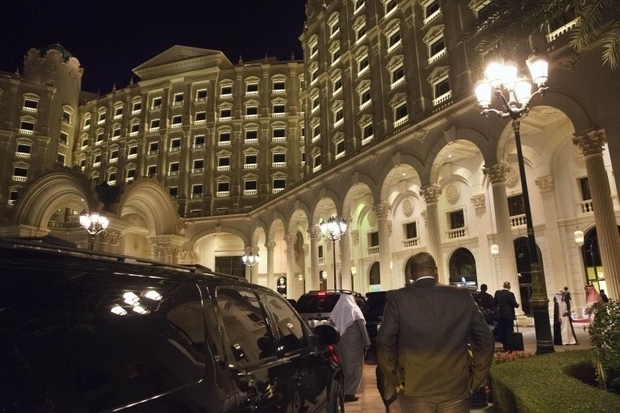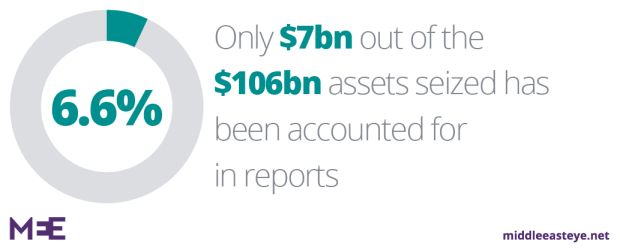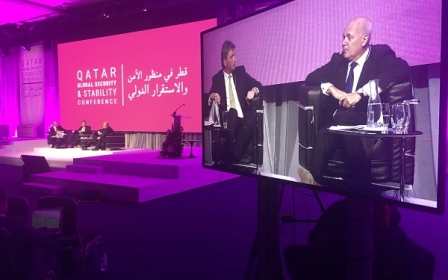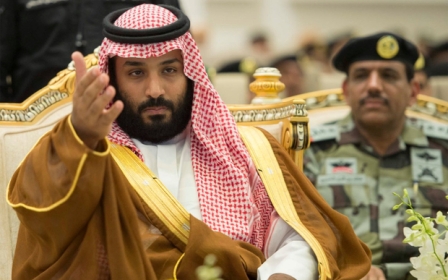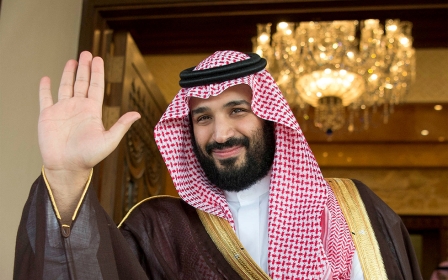After the Saudi purge: The $106bn question hanging over the kingdom
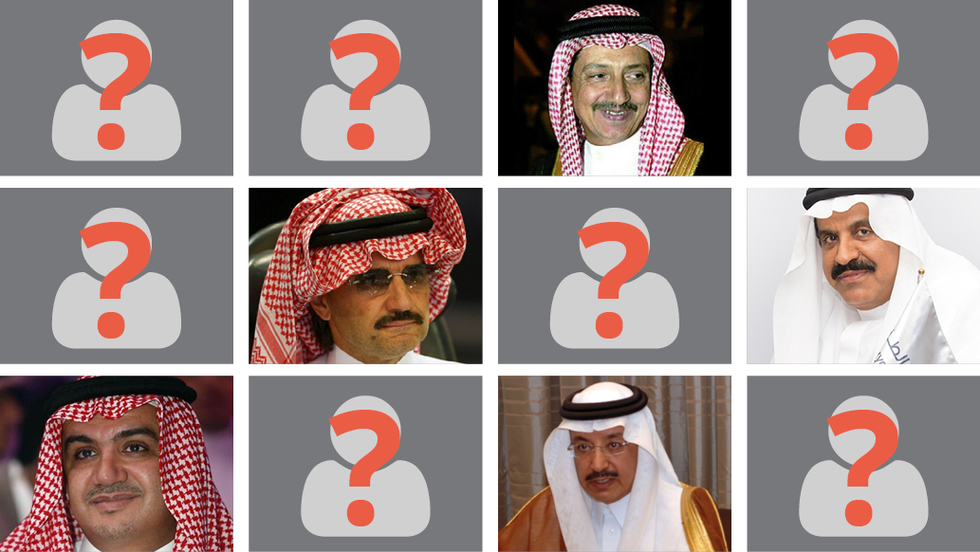
As the Ritz-Carlton Riyadh's $650-per-night rooms return to paying guests, a Middle East Eye investigation raises questions over the extent to which Saudi Arabia has cracked down on corruption.
Apple and Amazon are charging in to invest in the kingdom and Crown Prince Mohammed bin Salman (MbS) will set off on a "kingdom roadshow" to steel investor nerves in Western financial capitals in the coming weeks.
But MEE's investigation reveals that basic questions remain over the events that started on 4 November when a group of royals and businessmen was summoned to the five-star hotel for what they believed would be a late-night meeting with MbS.
After the majority of princes and tycoons were released, Saudi Arabia’s attorney general Sheikh Saud al-Mojeb said that more than $106bn had been seized from 381 Saudi citizens, according to a 30 January statement.
But MEE's investigation shows that very little is known about the majority of those who were locked up, what kind of assets they may have been forced to hand over and if - or how - the final figure tallies.
A financial advisor in the Gulf with detailed knowledge of several of the detainee said: "The numbers don't gel."
MbS and his supporters say that the crackdown was a type of "shock therapy" neccessary to rein in decades of high-flying corruption that have left the kingdom with a $52bn deficit.
"It's messy, it's disruptive, it has short term negative implications, but long term, it's a very positive development," Ali Shihabi, director of the Washington, DC-based Arabia Foundation, told CNBC.
But the lack of transparency around the campaign suggests that the same players and practices used before the purge will carry on.
Bruce Riedel, a former CIA analyst and director of the Brookings Intelligence project, said: "If it was a true corruption probe, then the government would have every interest in ensuring that everyone knew who was arrested and what the charges were.
"If those details are not available, it's because the Saudi government is trying to cover something up and that thing is that this wasn't about corruption at all. This is about raising money for a country that has a severe economic problem."
Who were the other 350 arrested?
The identities of around 30 of the Saudis arrested in the November campaign have been well-documented. The most prominent - and richest - is Prince Alwaleed bin Talal, who was released last month, saying in an interview while he was still in the Ritz that it had all been a "misunderstanding".
'The majority of people? Nobody knows anything about them'
- Yahya Assiri, founder of Saudi human rights advocacy group Al-Qst
Others arrested included prominent businessmen from a variety of sectors; royals including Prince Miteb bin Abdullah who was once a contender for the Saudi throne, and several former and current government officials.
One detainee - Ibrahim al-Assaf, a current minister of state and adviser to King Salman - retained his role and, after his release, led the Saudi delegation at the World Economic Forum in Davos in January.
MEE has identified 34 detainees. But if, according to al-Mojeb, 381 people were arrested, then who are the others?
Just weeks before the November purge, a group of more than 60 clerics, human rights activists, journalists and poets were detained.
While the arrests garnered much less media attention, their identities are largely known to human rights organisations and have been compiled in a list by Al-Qst, a Saudi human rights organisation with an underground network of activists in the kingdom.
Not so those seized in November. MEE contacted four of the main human rights organisations which monitor Saudi Arabia - Human Rights Watch, Amnesty International, Alkarama Foundation and Al-Qst - to see if they could supply a list of the detainees.
Only Al-Qst had a list - and that had only 30 people on it.
"The majority of people?" said Yahya Assiri, founder of Al-Qst. "Nobody knows anything about them."
How much of that $106bn is hard cash?
Days after the first arrests in November, Saudi officials said that they aimed to seize $800bn in cash and other assets. Ten days later, that figure halved to between $400-$300bn. Now it's $106bn.
"What it shows is this wasn't very well planned and that's not a surprise," Riedel said.
One reason the estimate has dropped may be the difficulties Saudi officials have had in seizing assets outside of the kingdom. Some have been tied up in legal agreements that make change of ownership complicated or are in Swiss banks, where attempts to seize funds have been rebuffed, according to the Financial Times.But even the $106bn figure raises questions. Dollar figures have only been reported for two settlements - those of Prince Alwaleed bin Talal ($6bn) and Prince Miteb bin Abdullah ($1bn) - accounting for $7bn. However, Bin Talal has disputed that amount and told Reuters in an interview last month that he didn't expect to hand over "anything at all".
In addition to the two princes, there are seven others who have reportedly settled:
- Bakr Bin Laden, chairman of the Saudi Binladin Group, who is said, along with family members, to have transferred some shares in Saudi Binladin to the state, but whose company continues to be privately run. However, a well-informed Saudi source on Monday told MEE that Bin Laden is still in state custody
- Waleed al-Ibrahim, chairman of Middle East Broadcasting Center (MBC), who has been ordered to hand over a controlling stake in MBC valued at more than $2bn
- Mohammad al-Tobaishi, former head of the Royal Court, handed over unspecified amount of cash and property
- Mohammed bin Hamoud Al Mazyad, former assistant minister of finance
- Saoud al-Daweesh, former CEO of Saudi Telecom
- Saleh Kamel, chairman and founder of Dallah Albaraka Group
- Prince Turki bin Khalid
There were no reported details about what assets the other five offered, if any. The same Saudi source said on Monday that Amr Dabbagh, chairman and CEO of Al-Dabbagh Group, has also settled, but has not been released.
Saudi authorities have said they expect that $13.3bn of the $106bn to go towards the state's finances by the end of the year.
But the Gulf financial advisor familiar with the players, who requested anonymity because he continues to work in the region, said the numbers don't add up.
Aside from Bin Talal and Mohammed Al-Amoudi, a Saudi-Ethiopian businessman, he said, the other detainees "are all much smaller". If Bin Talal gave $6bn - and again, that's a figure he disputes - then how is it possible to get to $99bn from the rest?
"There are some people here worth a billion, maybe 100 million. Even if you do an average – there are 350 people. And each of them is basically worth $500mn – that’s $175bn. I don’t believe they’ve taken basically half of their wealth away from them," the advisor said.
One way to get to $100bn, he explained, is to factor in the value of property seized by the authorities - but that doesn't necessarily bring cash to coffers."Who are you going to sell it to?" the advisor said. "It's a desert place so it would be very difficult."
The other explanation is that the government may have told companies to whom it owes money - like Saudi Binladin Group which is reportedly owed around $30bn - that it will not pay off its debts.
Again, money is saved - but that's different from having cash in the bank.
Why don’t we know more?
Julia Legner, the regional legal officer for the Gulf at the Alkarama Foundation, explained that those detained in November depend on those in power if they want to operate - and still need their support to continue doing so. This is in contrast to those arrested in September, who have spoken out against the state in the past
"If you are a businessman or a member of the royal family, you need a network. You can't just denounce them," she said. "There is a lot of money and existence at stake."
Both Assiri and Legner said that while the disappearances and arrests were standard fare for Saudi Arabia, the volume of arrests in November, paired with the lack of information about who was involved, is unprecedented.
"Everyone in Saudi Arabia – he thinks, am I in the queue?" Assiri said.
And there are other unanswered questions, said Riedel. What are the conditions, for example, that have been set on those who are released? In particular, are they free to move their assets around?
"The obvious assumption would be that anyone who went through this experience, once they were released, would go home and try to transfer all of their assets out of the kingdom to the US and the UK where they would be safe," he said.
And there is still the missing answer to the ultimate question: where is that $106bn now?
MEE contacted the Saudi Arabia embassies in London and the US for comment, but did not get a response.
This article is available in French on Middle East Eye French edition.
New MEE newsletter: Jerusalem Dispatch
Sign up to get the latest insights and analysis on Israel-Palestine, alongside Turkey Unpacked and other MEE newsletters
Middle East Eye delivers independent and unrivalled coverage and analysis of the Middle East, North Africa and beyond. To learn more about republishing this content and the associated fees, please fill out this form. More about MEE can be found here.


